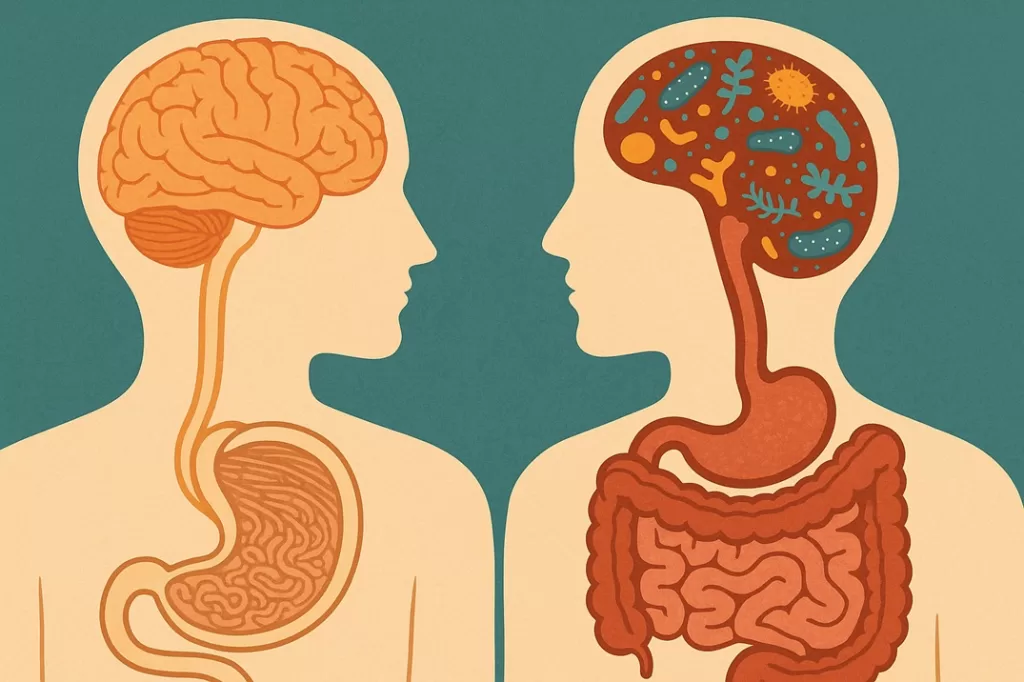Contents
- 1 1. Understanding the Gut-Brain Connection
- 2 2. How Digestive Health Influences Mood and Focus
- 3 References & Resources
- 4 3. Key Foods to Support the Gut-Brain Connection
- 5 4. Lifestyle Habits that Enhance Gut-Brain Health
- 6 5. The Impact of Hydration and Sleep on Gut-Brain Communication
- 7 Internal Links
- 8 6. Probiotic Supplementation for Gut-Brain Health
- 9 7. Daily Routine to Strengthen the Gut-Brain Connection
- 10 Conclusion
- 11 References & Resources
1. Understanding the Gut-Brain Connection
The term gut-brain connection refers to the bidirectional communication system between your digestive tract and your central nervous system. This system, known as the gut-brain axis, involves multiple pathways:
- Neural Pathways: The vagus nerve is the primary highway of communication, sending signals between the gut and the brain.
- Hormonal Signals: Gut cells produce hormones like serotonin and dopamine, which influence mood and cognition.
- Immune System Responses: Gut bacteria interact with immune cells, affecting inflammation levels that can impact mental health.
- Microbiome Influence: The trillions of bacteria in your gut produce metabolites that can either support or disrupt brain function.
Studies have shown that individuals with a diverse and balanced gut microbiome often experience better mood regulation, improved focus, and reduced stress levels. Conversely, gut dysbiosis—an imbalance in gut bacteria—has been linked to anxiety, depression, and cognitive decline.
Scientific Evidence Supporting the Gut-Brain Axis
- A landmark study by UCLA demonstrated that women who consumed probiotics showed altered brain activity in areas related to emotion and sensation.
- Harvard Medical School emphasizes the gut’s role in producing neurotransmitters like serotonin, highlighting its impact on mood and emotional well-being.
- The National Institutes of Health (NIH) has published research showing how gut health influences neuroinflammation, a key factor in cognitive disorders.
2. How Digestive Health Influences Mood and Focus
Your digestive system plays a pivotal role in your mental state. Here’s how a healthy gut environment can enhance your mood and sharpen your focus:
2.1. Serotonin Production
- About 90% of the body’s serotonin—a neurotransmitter regulating mood, sleep, and appetite—is produced in the gut.
- A balanced microbiome supports serotonin synthesis, promoting feelings of well-being and emotional stability.
2.2. Inflammation Control
- Chronic inflammation in the gut can trigger neuroinflammation, negatively affecting memory and concentration.
- Probiotics and prebiotics help maintain gut barrier integrity, reducing systemic inflammation and supporting brain health.
2.3. Stress Response Modulation
- The gut microbiota influences the hypothalamic-pituitary-adrenal (HPA) axis, which controls stress hormone levels like cortisol.
- A balanced gut can mitigate exaggerated stress responses, helping you stay calm and focused under pressure.
2.4. Cognitive Function and Brain Fog
- Gut bacteria produce short-chain fatty acids (SCFAs) like butyrate, which support brain cell health and energy metabolism.
- An optimized gut environment reduces brain fog and enhances cognitive clarity.
2.5. Mood Disorders and Gut Dysbiosis
- Research has linked imbalances in gut flora to conditions like depression and anxiety.
- Restoring gut health through diet, lifestyle, and supplementation can alleviate these symptoms naturally.
2.6. The Role of Diet in Gut-Brain Health
- Dietary choices significantly impact the composition and diversity of your gut microbiome.
- High-fiber, plant-based foods support beneficial bacteria, while processed foods and excessive sugars disrupt microbial balance.
2.7. Lifestyle Factors Affecting the Gut-Brain Axis
- Physical activity, sleep quality, stress management, and hydration all influence gut health and, consequently, mental well-being.
References & Resources
- Harvard Health: The Gut-Brain Connection
- NIH: Role of Gut Microbiota in Mental Health
- Hair, Skin, and Nails Support Essentials
3. Key Foods to Support the Gut-Brain Connection
Your diet plays a fundamental role in nurturing a healthy gut-brain connection. The following foods are scientifically proven to support gut health and, in turn, positively influence mood and cognitive function:
3.1. High-Fiber Foods
- Leafy Greens: Spinach, kale, and Swiss chard feed beneficial gut bacteria with prebiotic fibers.
- Legumes: Lentils, chickpeas, and beans promote microbial diversity essential for gut-brain communication.
- Whole Grains: Oats, quinoa, and brown rice provide resistant starches that fuel gut microbes.
3.2. Fermented Foods
- Yogurt & Kefir: Rich in live probiotics that replenish gut flora.
- Sauerkraut & Kimchi: Natural sources of beneficial lactic acid bacteria.
- Kombucha: A fermented tea packed with probiotics and antioxidants.
3.3. Omega-3 Rich Foods
- Fatty Fish: Salmon, sardines, and mackerel reduce gut inflammation and support brain health.
- Chia Seeds & Flaxseeds: Plant-based sources of omega-3s essential for cognitive function.
3.4. Polyphenol-Rich Foods
- Berries: Blueberries and raspberries contain antioxidants that modulate gut bacteria.
- Green Tea: Supports gut flora balance and improves mental focus.
- Dark Chocolate (70%+ cacao): Contains flavonoids beneficial for gut-brain signaling.
3.5. Probiotic Supplements
While food sources are essential, consistent support from high-quality probiotic supplements enhances the gut-brain connection effectively. Products like Spring Way Nutrition’s Probiotic 40 Billion with Prebiotics deliver a potent dose of beneficial bacteria alongside prebiotic fibers to nourish your microbiome daily.
4. Lifestyle Habits that Enhance Gut-Brain Health
Beyond diet, certain lifestyle practices are crucial for maintaining a strong gut-brain connection. These habits optimize gut function and support mental clarity:
4.1. Regular Physical Activity
- Exercise stimulates gut motility and promotes a diverse microbiome.
- Activities like brisk walking, yoga, and resistance training enhance gut flora composition.
- Physical movement reduces stress hormones, supporting balanced gut-brain communication.
4.2. Mindfulness and Stress Management
- Chronic stress negatively impacts gut health, leading to dysbiosis and inflammation.
- Mindfulness practices such as meditation and breathing exercises calm the nervous system and support gut equilibrium.
- Even 10 minutes of daily mindfulness can significantly improve the gut-brain axis function.
4.3. Limiting Ultra-Processed Foods
- High consumption of processed foods disrupts gut microbial balance.
- Artificial sweeteners, trans fats, and preservatives negatively affect gut bacteria diversity.
- Choosing whole, minimally processed foods supports a healthier gut environment.
4.4. Intermittent Fasting and Gut Health
- Time-restricted eating gives the gut time to rest and repair.
- Studies suggest intermittent fasting enhances gut barrier function and reduces inflammation.
4.5. Avoiding Overuse of Antibiotics
- While necessary in some cases, excessive antibiotic use disrupts gut flora balance.
- Support gut recovery post-antibiotics with probiotics and prebiotic-rich foods.
5. The Impact of Hydration and Sleep on Gut-Brain Communication
Two often-overlooked factors that profoundly affect the gut-brain connection are hydration and sleep quality.
5.1. Hydration and Gut Health
- Water aids in digestion, nutrient absorption, and waste elimination.
- Adequate hydration supports the mucosal lining of the intestines, essential for effective gut-brain signaling.
- Dehydration can lead to constipation and gut microbial imbalances, indirectly affecting mood and focus.
5.2. Sleep Quality and the Microbiome
- Sleep deprivation negatively alters gut microbiota composition.
- Poor sleep increases gut permeability, leading to systemic inflammation that affects cognitive function.
- Establishing a consistent sleep routine supports both gut health and mental clarity.
5.3. Practical Tips for Hydration and Sleep
- Start your day with a glass of water and maintain steady hydration throughout.
- Limit caffeine intake after noon to prevent sleep disturbances.
- Create a bedtime routine with minimal screen time and a calm environment.
- Aim for 7-9 hours of restful sleep nightly to support overall gut-brain harmony.
Internal Links
6. Probiotic Supplementation for Gut-Brain Health
While a healthy diet and lifestyle form the foundation of a strong gut-brain connection, probiotic supplements offer targeted support that can enhance these efforts. Here’s how they contribute:
6.1. Replenishing Gut Microbiota
- Probiotics introduce beneficial bacteria that may be lacking due to poor diet, stress, or antibiotic use.
- They help restore balance in the gut, supporting improved communication along the gut-brain axis.
6.2. Enhancing Neurotransmitter Production
- Specific probiotic strains aid in the production of serotonin, dopamine, and GABA, all critical for mood regulation and cognitive function.
6.3. Reducing Gut Inflammation
- Probiotics strengthen gut barrier integrity, reducing “leaky gut” and systemic inflammation that can impair brain function.
6.4. Improving Stress Response
- Regular probiotic intake has been shown to modulate cortisol levels, promoting a more balanced stress response and reducing anxiety symptoms.
6.5. Choosing a High-Quality Probiotic
When selecting a probiotic supplement, consider the following:
- Multi-strain formulas for broader microbiome support.
- Inclusion of prebiotics to nourish beneficial bacteria.
- Guaranteed potency and shelf stability.
A trusted option is the Probiotic 40 Billion with Prebiotics by Spring Way Nutrition, formulated to support digestive health and enhance the gut-brain connection naturally.
7. Daily Routine to Strengthen the Gut-Brain Connection
Consistency is key when it comes to nurturing your gut-brain connection. Here’s a practical daily routine you can adopt:
Morning
- Start your day with a glass of water and a probiotic supplement.
- Opt for a fiber-rich breakfast (e.g., oatmeal with berries and chia seeds).
- Practice 5-10 minutes of mindfulness meditation to reduce morning stress.
Midday
- Include fermented foods like yogurt or sauerkraut with lunch.
- Take a brisk 15-minute walk to support gut motility and mental clarity.
Afternoon
- Stay hydrated with water or herbal teas (avoid sugary drinks).
- Snack on nuts or dark chocolate for polyphenols that benefit gut bacteria.
Evening
- Enjoy a light, vegetable-rich dinner with prebiotic foods (e.g., garlic, onions).
- Wind down with a relaxing routine: limit screen time and engage in calming activities like reading.
Night
- Aim for 7-9 hours of quality sleep to support gut repair and brain health.
Conclusion
The intricate gut-brain connection influences far more than digestion—it’s central to your mood, focus, and overall mental well-being. By nourishing your gut through balanced nutrition, mindful habits, adequate hydration, quality sleep, and strategic supplementation, you empower your mind and body to function at their best.
For those seeking an effective, science-backed way to support digestive health, consider adding Probiotic 40 Billion with Prebiotics from Spring Way Nutrition to your daily routine. It’s a simple yet powerful step toward a healthier gut and a sharper, more balanced mind.
References & Resources

David Turner is a wellness enthusiast who believes that healthy living starts with small, consistent choices. He founded the SpringWay Blog to share practical tips on nutrition, daily habits, and balanced routines for a better quality of life. Living in Oregon, USA, David enjoys hiking, cooking wholesome meals, and encouraging others to take care of their health—naturally and confidently.

